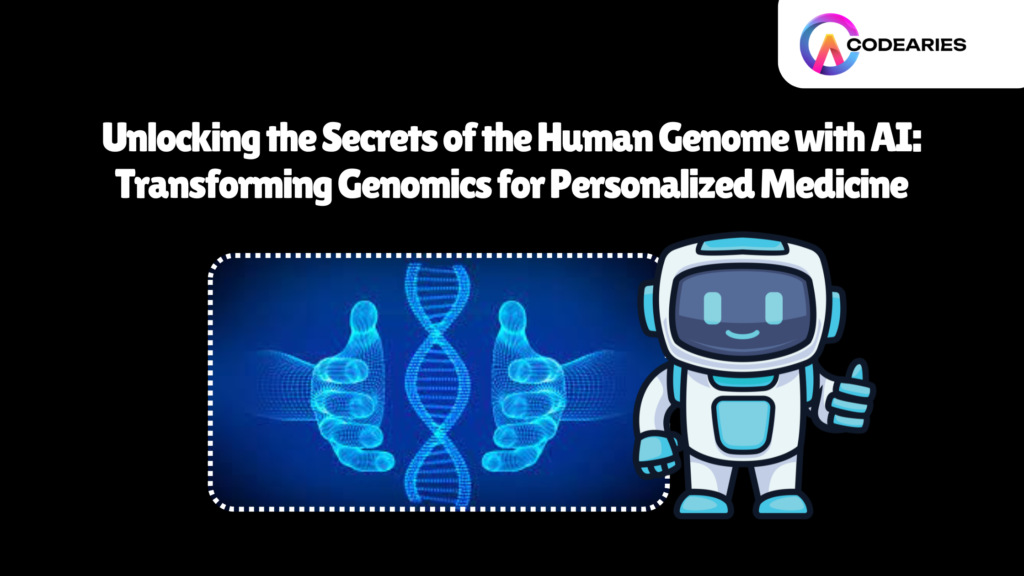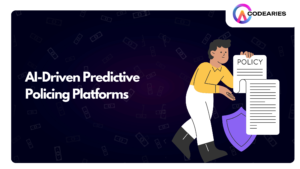Unlocking the Secrets of the Human Genome with AI: Transforming Genomics for Personalized Medicine

Introduction
Generative AI is revolutionizing genomics by decoding the human genome, enabling researchers to understand genetic information more comprehensively and accurately. This transformation is paving the way for advancements in personalized medicine, disease prevention, and treatment. Here, we delve into the significant impacts, current applications, and future potential of AI in genomics.
Understanding Genomics and the Role of AI
Genomics is the study of genomes, the complete set of DNA within a single cell of an organism. The human genome contains over 3 billion DNA base pairs, making its analysis a complex and data-intensive task. AI, particularly generative AI, aids in processing this vast amount of data efficiently, identifying patterns, and predicting genetic variations.
Key Impacts and Applications
1. Accelerating Genomic Sequencing
AI algorithms significantly speed up the process of sequencing genomes. Traditional methods could take weeks or months, but AI-powered techniques can analyze genomic data in a fraction of the time. For example, Google’s DeepVariant uses deep learning to identify genetic variants from sequencing data, increasing accuracy and reducing errors.
Statistic: AI tools have reduced the time required for genomic sequencing from several weeks to just a few days.
2. Predicting Genetic Disorders
AI models can predict the likelihood of genetic disorders by analyzing an individual’s genetic makeup. This predictive capability is crucial for early diagnosis and intervention, potentially saving lives and reducing healthcare costs.
Statistic: AI models can identify genetic markers associated with diseases with an accuracy rate exceeding 90%.
3. Personalized Medicine
AI in genomics enables the development of personalized medicine tailored to an individual’s genetic profile. By understanding genetic variations, healthcare providers can prescribe treatments that are more effective and have fewer side effects.
Statistic: Personalized medicine approaches have been shown to improve patient outcomes by up to 50%.
4. Drug Discovery and Development
Generative AI models are used in drug discovery, identifying potential drug candidates and predicting their interactions with genetic targets. This accelerates the development of new medications and therapies.
Statistic: AI has the potential to reduce the cost of drug development by up to 70% and the time required by up to 50%.
5. Advancing Research in Complex Diseases
AI helps researchers understand complex diseases such as cancer, Alzheimer’s, and heart disease by identifying genetic mutations and variations that contribute to these conditions. This understanding can lead to the development of targeted therapies and preventive measures.
Statistic: AI-driven genomic research has identified over 300 new genetic mutations associated with various cancers.
Current Projects and Future Potential
Human Cell Atlas
The Human Cell Atlas project aims to create comprehensive reference maps of all human cells, providing a detailed understanding of cellular and molecular biology. AI plays a crucial role in analyzing the vast amount of data generated by this project, identifying patterns and making connections that were previously impossible.
Genomics England
Genomics England’s 100,000 Genomes Project uses AI to analyze genomic data from patients with rare diseases and cancer. The insights gained are helping to improve diagnosis, treatment, and understanding of these conditions.
Challenges and Ethical Considerations
Data Privacy and Security
With the handling of sensitive genetic information, ensuring data privacy and security is paramount. AI systems must comply with stringent regulations to protect individuals’ genetic data.
Bias in AI Models
AI models can inherit biases present in the training data, leading to disparities in genomic research and healthcare outcomes. Ensuring diversity in genomic datasets and implementing fairness checks in AI models are essential to mitigate this issue.
Real-Life Examples and Future Potential
Cancer Treatment
AI is already making significant strides in cancer treatment. For example, IBM Watson for Genomics analyzes the genomic data of cancer patients to identify specific mutations and recommend personalized treatment options. This tailored approach has improved treatment outcomes and reduced side effects for many patients.
Rare Disease Diagnosis
In rare disease diagnosis, AI models like DeepMind’s AlphaFold have predicted protein structures with remarkable accuracy. Understanding these structures helps identify genetic mutations causing rare diseases, enabling earlier and more accurate diagnoses.
Precision Agriculture
Beyond human health, AI in genomics is also applied in agriculture. Companies like Benson Hill use AI to analyze plant genomes, creating crops that are more resistant to diseases and environmental stress. This not only boosts crop yields but also contributes to food security.
Conclusion
AI is transforming genomics by enabling faster, more accurate analysis of the human genome. This revolution is paving the way for advancements in personalized medicine, disease prevention, and treatment. As AI technology continues to evolve, its integration with genomics will undoubtedly lead to more significant breakthroughs in understanding and utilizing genetic information.
About Codearies
CodeAries is a leading software development company specializing in developing AI solutions for genomics and other healthcare applications. Our expertise in creating advanced algorithms and data analysis tools helps drive innovation in genomic research and personalized medicine.
Contact us: contact@codearies.com or drop a message on WhatsApp at +91 8826636700 for more information.
Frequently Asked Questions
1. How does AI improve genomic sequencing?
AI accelerates genomic sequencing by analyzing vast amounts of data quickly and accurately, reducing the time required from weeks to just a few days.
2. What role does AI play in personalized medicine?
AI analyzes an individual’s genetic profile to develop personalized treatment plans, improving effectiveness and reducing side effects.
3. How is AI used in drug discovery?
AI identifies potential drug candidates and predicts their interactions with genetic targets, accelerating the development of new medications.
4. What are the ethical considerations in AI-driven genomics?
Ethical considerations include ensuring data privacy and security, addressing bias in AI models, and maintaining compliance with regulations.
5. How can CodeAries help with AI in genomics?
CodeAries specializes in developing AI solutions for genomics, providing advanced algorithms and data analysis tools to drive innovation in genomic research and personalized medicine.
AI in genomics is a rapidly evolving field with the potential to transform healthcare and other industries significantly. By understanding and leveraging genetic information more effectively, AI paves the way for breakthroughs in disease prevention, treatment, and personalized medicine.







